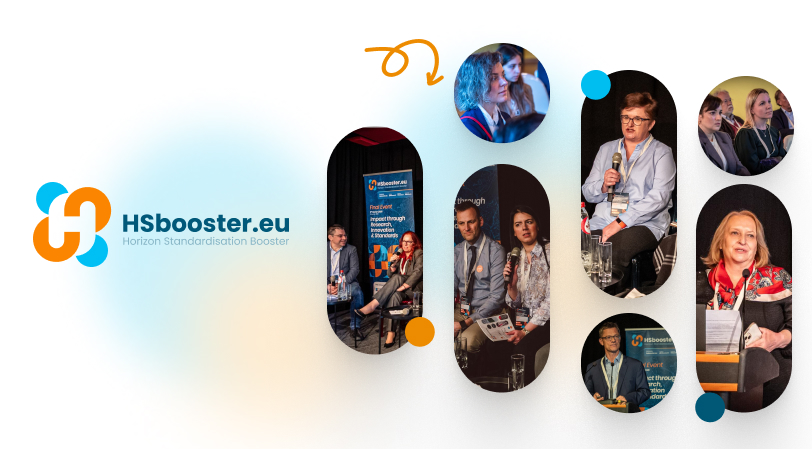
Not many EU-funded projects know this, but transferring research results to a standards-setting organisation can increase their value, extend exploitation, spur innovation and transform these results into marketable solutions...
So few projects realised this, that in 2022 the European Commission, through its Horizon Europe programme, funded HSBooster.eu to pilot the first European Standardisation Booster for EU-funded projects. The need for action was even cited in the EC’s Code of Practice on Standardisation, which identified the key role that HSBooster.eu could have in addressing this gap.
Since then, HSbooster.eu has designed and delivered mentoring and training services to over 300 projects in key research domains, equipping them with the right knowledge and expertise to plan strategically and contribute efficiently to the standardisation process.
Trust-IT is playing a key role in the project, leading the dissemination and communication activities which has successfully recruited the first community of standardisation experts who delivered these mentoring services and co-organising over 30 events. This has resulted in the formation of a consolidated community of project consortia, researchers, SMEs, and policy makers turned on to standardisation. HSbooster.eu is coordinated by Trust-IT’s sister company COMMpla with a consortium boasting expertise in different aspects of standardisation: Dublin City University (IE), University of Belgrade (RS), Dansk Standards (DK), and SGS (ES).
How did HSbooster.eu make standardisation relevant in the Research & innovation Space?
The overall objective was to boost projects’ abilities and expertise so that they could understand, map, and integrate standardisation into their project strategies. To do this, the project recruited over 200 experts from European and international standardisation bodies to mentor EU-funded projects. Each expert was vetted and where appropriate, matched to projects who applied for support. Experts and applicant projects then met, and through a series of online meetings, experts were able to mentor projects in understanding the standardisation readiness of their results and relevant standards to either adopt or contribute to. This hands-on approach enabled projects to strategically align their research with relevant standards, maximising their impact and market readiness.
To support this, a Training Academy was created, including over 20 online courses providing information on the benefits and impact of standardisation on valorising project results, overviews of the EU and international standards landscape, and practical aspects of standardisation, including how to get involved and the soft skills required. This was supported by several training webinars, while an exciting new role-play game called the Serious Smiley Game was developed to improve negotiating skills in standardisation technical committee meetings. The game has certainly left many people smiling, having been played at European universities and National Standards Bodies with excellent results.
Brussels on 5th March 2025 culminated in an explosion of results & community!
Early this March HSbooster.eu event, Insights and Future Directions for Standardisation in R&I gathered the HSbooster.eu community and key stakeholders, including policymakers, research projects that benefitted from mentoring, and the standardisation experts who have mentored them, in Brussels. The event, opened by Ioannis Sagias, Deputy Head of Unit for Valorisation Policies and IPR at DG Research and Innovation, showcased success stories and insights into how standardisation can enhance the adoption of research results. Key contributors to the success of the project were also present, including Magnus Hakvag, House of Knowledge, who commented that standards can be really sexy just as long as you are wearing the right glasses!
Nicholas Ferguson, the project coordinator from COMMpla and Trust-IT, commented: “The Standardisation Booster has really changed the mindset of how so many projects view standards. It’s helped to shape the strategies of so many different projects in very different domains, ensuring that there is a flow of contributions to standardisation priorities from the research and innovation projects. We have so many stories to share and so many different ways that the experts have directly helped projects in this space.”
Impact showcased through the projects we supported!
Among the many EU funded projects - each contributing to the objectives of the updated EU Industrial Strategy and broader policy priorities including the European Green Deal and the Digital Decade, we highlight a few here: Nebulous, focused on sustainable digitalisation, and leveraged the Standardisation Booster service to refine its standardisation strategy and establish a liaison with CEN-CLC/JTC 13: Cybersecurity and Data Protection, while Mobispaces, supporting green mobility, successfully aligned its research outputs with existing standards. The FAME project, also committed to sustainable digitalisation and energy efficiency in the data marketplace, experienced a complete transformation in its standardisation mapping, thanks to expert intervention. The PONDERFUL project, addressing resilience climate change-related pond research, identified key findings to share with standardisation groups and worked towards the preparation of a New Work Item Proposal, while nanoMECommons, which promotes green transition in Europe, led the revision of CWA 17815:2021 (Materials Characterisation – Terminology, Metadata and Classification).
A collection of all of the success stories presents the real challenges faced by projects in navigating the standardisation landscape, the tailored solutions identified with expert support, and the individuals driving these efforts, their knowledge and the network behind their work. More details on the community are presented in the Expert and Project hubs.
…and it does not stop here…
As a project, HSbooster.eu is reaching its final stages and its influence on EU research projects and standardisation is plain to see. The final event saw repeated calls for a follow-up booster service, highlighting the value of maintaining expert guidance, stakeholder engagement, and knowledge-sharing mechanisms. The consortium has also put forward recommendations for the sustainability of such services in future EU standardisation efforts.
So what’s next? The consortium is committed to taking the results of the booster to the next level. Trust-IT will continue to offer mentoring services via the pool of experts recruited. Dansk Standards will continue to deliver webinars on standardisation priorities, with the next one already planned for 8th May on Digital Data Spaces. Meanwhile, the University of Belgrade will continue to run training workshops and the Serious Smiley Game. In this way, the Standardisation Booster Services will continue to provide expert support to EU projects on standardisation. If you and your project are interested in finding out more, then watch this space as we announce the re-launch of the mentoring services and related events. In the meantime, you can express your interest in joining the HSbooster.eu community as a standardisation expert or beneficiary project at this link
For more information and access to HSbooster resources, visit HSbooster.eu.

